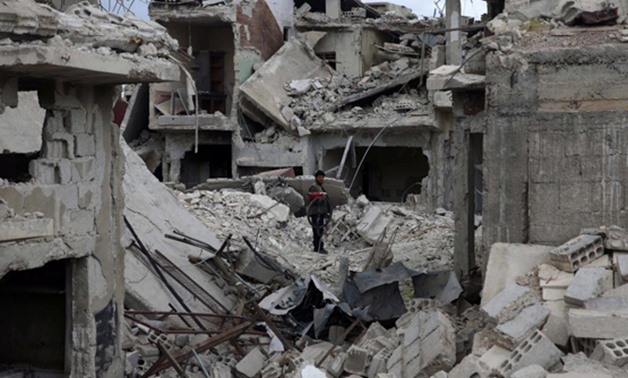
A man stands on rubble of damaged buildings in the besieged town of Douma, Eastern Ghouta, in Damascus, Syria March 30, 2018. REUTERS/Bassam Khabieh
LONDON/MOSCOW - 12 April 2018: British ministers planned to gather on Thursday to discuss whether to join the United States and France in a possible military attack on Syria that threatens to bring Western and Russian forces into direct confrontation.
Prime Minister Theresa May recalled the ministers from their Easter holiday for a special cabinet meeting on how to respond to what she has cast as a barbaric poison gas attack by Syrian government forces on civilians in the formerly rebel-held town of Douma, just east of the capital Damascus.
There were signs, though, of a global effort to head off a dangerous conflict pitting Russia against the West. The Kremlin said a crisis communications link with the United States, created to avoid an accidental clash over Syria, was in use.
The British cabinet meeting was due to begin at 1430 GMT. "The situation in Syria is horrific, the use of chemical weapons is something the world has to prevent," Brexit minister David Davis said on Thursday morning.
"But also it's a very, very delicate circumstance and we've got to make this judgment on a very careful, very deliberate, very well thought-through basis."
Russia, the Syrian government's most important ally in its seven-year-old war with rebels, said it had deployed military police in Douma on Thursday after the town was taken over by government forces.
"They are the guarantors of law and order in the town," RIA news agency quoted Russia's defence ministry as saying.
U.S. President Donald Trump warned Russia on Wednesday that missiles "will be coming" in response to the April 7 gas attack, alleged to have killed dozens of people, and lambasted Moscow for standing by Syrian President Bashar al-Assad.
Syria's military has repositioned some air assets to avoid fallout from possible missile strikes, U.S. officials told Reuters on Wednesday.
Syria's attempt to shelter aircraft, perhaps by locating them alongside Russian military hardware that Washington might be reluctant to hit, could limit damage that the United States and its allies might be able to inflict on Assad's military.
The Syrian Observatory for Human Rights, a British-based war monitor, also said pro-Syrian government forces were emptying main airports and military air bases.
World stocks edged down as anxious investors stayed wary of risky assets.
MATTIS CAUTIOUS
U.S. Defense Secretary Jim Mattis, striking a cautious tone after Trump's threat of missile strikes, said on Wednesday the United States was assessing intelligence about the suspected toxic gas attack.
Asked if he had seen enough evidence to blame the Syrian president, Mattis said: "We're still working on this."
Both Syria and Russia have said reports of the attack were fabricated by rebels and rescue workers in Douma and have accused the United States of seeking to use it as a pretext to attack the government.
In Moscow, the head of a Russian parliamentary defence committee, Vladimir Shamanov, said Russia was in direct contact with the U.S. Joint Chiefs of Staff about the situation.
The Russian military said it had observed movements of U.S. Navy forces in the Gulf. Any U.S. strike would probably involve the navy, given the risk to aircraft from Russian and Syrian air defences. A U.S. guided-missile destroyer, the USS Donald Cook, is in the Mediterranean.
Moscow's ambassador to Lebanon, Alexander Zasypkin, warned on Wednesday that any U.S. missiles fired at Syria would be shot down and the launch sites targeted.
The Syrian conflict has increasingly widened the rifts between Moscow, Washington and European powers and inflamed the bitter rivalries that run across the Middle East.
Syria, Iran and Russia say Israel was behind an air strike on a Syrian air base on Monday that killed seven Iranian military personnel, something Israel has neither confirmed nor denied.
Russian President Vladimir Putin spoke to Israeli Prime Minister Benjamin Netanyahu by phone on Wednesday and urged him to do nothing to destabilise Syria.
Netanyahu's office said: "The prime minister reiterated that Israel will not allow Iran to establish a military presence in Syria."
Turkish President Tayyip Erdogan said he had spoken to Trump on Wednesday and would speak to Putin on Thursday night about the chemical attack.
May has ordered British submarines to move within missile range of Syria in readiness for strikes against the Syrian military that could begin as early as Thursday night, London's Daily Telegraph newspaper said on Wednesday.
The BBC reported that May was ready to give the go-ahead for Britain to take part in military action. She would not seek approval from parliament, the BBC said, despite calls from the opposition Labour Party for parliament to be given a say.
Parliament voted down British military action against Assad's government in 2013 in an embarrassment for May's predecessor, David Cameron. That then deterred the U.S. administration of Barack Obama from similar action.
British Minister Davis said his decision then to vote against action was based on a lack of clear evidence and a lack of a clear plan. "Those two things, I'm assured, we will get an answer to today," he said of Thursday's cabinet meeting.


Comments
Leave a Comment